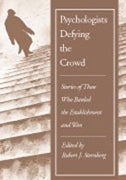Dr. Dean Keith Simonton, Distiguished Professor of Psychology
Course Goals: We will examine the history of psychology from two perspectives, namely, theory and application. The core question from the theoretical perspective is the extent to which the key figures and events in the history of the field can be explicated in terms of empirical findings in the metasciences, with special emphasis on the psychology of science. The central issue from the applied perspective is the degree that the history of psychology can provide guidance for (a) evaluating the scientific status of contemporary psychology and (b) helping researchers make high-impact contributions to the discipline.
Prerequisite: Graduate standing or consent of instructor.
The Details
Grading
Your grade will be based on the following:
I. Overall class participation (10%)
II. Three brief class presentations with discussion:
A. On a high-impact article or book in psychology based on a chapter chosen from The Anatomy of Impact (20%):
Date: 1/26/2011 For guidelines and options, go here
B. On a influential psychologist in the field based on a chapter chosen from Psychologists Defying the Crowd (20%):
Date: 2/16/2011 For guidelines and options, go here
C. On the subject of the term paper, as described below (20%)
Date: 3/09/2011
III. Term paper in which a major figure in psychological science is analyzed in terms of the profile of the typical great psychologist, using Great Psychologists as the primary framework (30%) This paper should consist of four parts: (a) an introduction giving basic information about the psychologist and why you selected him or her; (b) a presentation of the ways that your subject fits the profile; (c) a presentation of the ways that your subject does not fit the profile; and (d) a conclusion that gives your best assessment of the subject as a great psychologist. The paper should be no longer than 12 pages (APA style throughout). Although you can pick anybody you want, it will probably make research and writing easier if you select someone who comes up often in the main text. Another possibility is to write about someone who received APA’s Distinguished Scientific Contribution Award. For list, go here.
Due: 3/09/2011
Textbooks
Primary text:
Dean Keith Simonton. Great Psychologists and Their Times: Scientific Insights into Psychology’s History (APA Books, 2002).
Secondary texts:
Robert J. Sternberg (Ed.). Psychologists defying the crowd: Stories of those who battled the establishment and won (APA Books, 2002).
Robert J. Sternberg (Ed.). The anatomy of impact: What has made the great works of psychology great (APA Books, 2003).
Note: You will only need one chapter from each of the secondary texts. So you can just make a photocopy of the chapter. In the case of Sternberg (2002), because the authors each received pdfs of their contributions, you also have the option of emailing them with a request. Sternberg (2002), but not Sternberg (2003), is currently out of print.
Topics
The topics covered will follow closely the organization of the primary text, namely:
I. The Scientific History of Psychology
A. Eminence in Psychology
B. History and Science
II. Lifetime Output of Psychologists and Their Impact on the Field
A. Individual Differences in Productivity and Eminence
B. Longitudinal Changes in Creativity
C. The Creative Product in Psychology
III. Personal Characteristics that Contribute to Greatness as a Psychologist
A. Cognition
B. Disposition
C. Worldview
IV. Life-Span Development of Great Psychologists
A. Family Background
B. Career Training
C. Maturity and Aging
D. Nature versus Nurture
V. Sociocultural Context of Psychological Science
A. Internal Milieu
B. External Milieu
C. Genius versus Zeitgeist
VI. Implications for the Field of Psychology
A. Research
B. Teaching
For a more complete synopsis of the above, go here.
For errata to the text, go here.


